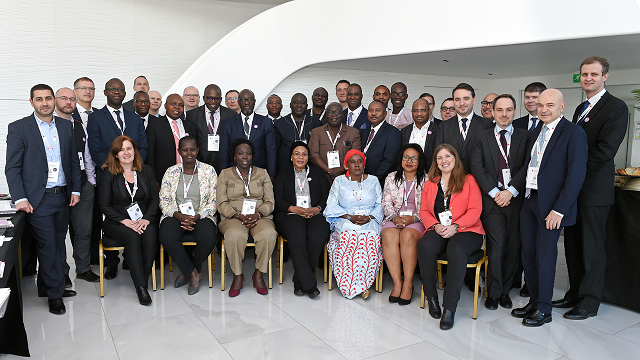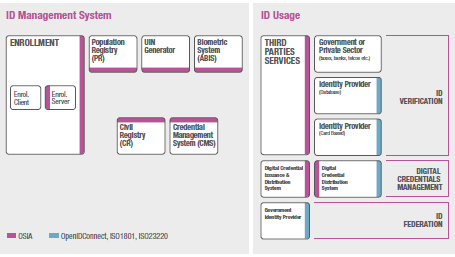OSIA
The OSIA initiative
- Governments and ID Industry working together to unlock the identity market by developing a universal interoperability framework for innovation, competition and sustainability.
- OSIA is an official International Telecoms Union Standardization Sector (ITU-T) Recommendation: X.1281 - APIs for interoperability of identity management systems.
- OSIA is a set of interfaces (APIs) that enables seamless connectivity between all building blocks of the identity management ecosystem – independent of technology, solution architecture or vendor.
It's happening today
X.1281 can be accessed here: https://www.itu.int/ITU-T/workprog/wp_item.aspx?isn=18778
OSIA v6.1.0. twin specification can be accessed here: https://osia.readthedocs.io/en/v6.1.0/index.html
OSIA qualification programme can be accessed here: https://globalplatform.org/osia-qualification-program/
OSIA Open Source Reference Implementation in partnership with NIIS (X-Road), UNDP (DGIT) and MIFOS (Payments) can be accessed here: https://github.com/SecureIdentityAlliance/osia-reference-implementation

Bringing the ecosystems together
The OSIA initiative provides seamless interconnection between multiple foundational and functional registries, and to enrolment and usage services, including :
Civil Registry
(CR)
managing vital events including births, deaths, associated certificates and filiation.
Population Registry
(PR)
managing key biographical information on individuals for the basis of ID cards and services.
Biometrics System
(ABIS)
managing biometrics and authentication services.
Functional Registers
(Funct Reg)
managing data including voter rolls, land registry, vehicle registration, passport, residence registry, education, health, benefits, police and judiciary data.
Integrated ID landscape based on open standards APIs.

Why choose an open standards approach?
Open standards specify the functional and technical requirements that all technologies need to ensure interoperability. With open standards in place, governments can strategically plan and evolve their systems without fear of future compatibility issues.
In an open-standards environment the responsibility (and the risk) of ensuring seamless interoperability is passed from government to the technology provider. It provides a guarantee of consistency and harmonization across government identity ecosystems that is unachievable by any other approach.
Value of open standards
- Globally applicable quality assurance
- Eliminates technology and partner dependency
- Removes technology barriers
- Grants freedom from lock-in
- De-risk future investments
The OSIA Initiative is driven by the belief that standardizing the scope of key components and the interface layer, rather than rebuilding components from the ground up, addresses governments’ needs for simplicity, speed of deployment and choice
The Guiding Principles
Sovereignty
The ability of governments to choose what their ID solution “looks like” is a core principle that goes to the very heart of sovereignty. They must have the freedom to decide which components of the identity ecosystem to use, and how to combine them.
Technology Neutrality
The value of deployed legacy technologies must be preserved, and governments free to use any technology they choose. Technology partners must also be free to innovate on emerging technologies to finds new ways to solve problems.
Privacy by Design
To achieve regulatory compliance and to ensure an ethical and responsible approach to managing citizen’s data, identity ecosystems must embed privacy by design – from repositories through to interface layers. Ecosystems must ensure data can be user controlled with stringent access rights.


